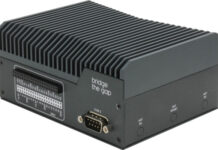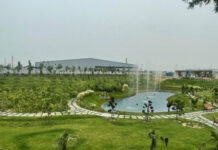In a significant move towards bolstering the Indian IT Hardware manufacturing ecosystem, the India Cellular & Electronics Association (ICEA) successfully hosted the “ICEA Conference on IT Hardware Ecosystem: Fostering Scale and Building Competitiveness” on January 15th, 2024, at Hotel Taj Mahal, Mansingh Road, New Delhi.
The event witnessed the participation of over 100 stakeholders from across the entire IT Hardware value chain, including companies approved under the revised Production Linked Incentive (PLI) 2.0 for IT Hardware. The conference served as a pivotal platform to discuss strategies for building large-scale manufacturing for IT Hardware and enhancing competitiveness to target the global market.
The IT Hardware Industry, which has been languishing as far as domestic manufacturing is concerned is expected to rise from the ashes. The situation is so grim that most of India’s consumption of laptops and tablets is met through the import of CBUs (Completely Built Units), to the tune of approximately USD 6 billion in FY22-23, primarily from China. This scenario underscores the critical need for a strategic shift towards bolstering the domestic IT hardware manufacturing capabilities with a view to become globally competitive in exports.
In the opening session, Pankaj Mohindroo, Chairman, ICEA passionately articulated: “Reflecting on our transformative journey in mobile phone production, where we scaled monumental heights, I confidently assert that the IT Hardware industry is on the brink of an epochal shift, which will turn the corner from complete import dependence to exports. This commitment is not just a promise; it’s our solemn pledge to catapult India into the forefront of global IT Hardware manufacturing. We are scripting a new chapter of industrial prowess and self-reliance.”
The conference was graced by the presence of Shri S. Krishnan, Secretary, Ministry of Electronics & Information Technology (MeitY), as the Chief Guest, and Shri Sushil Pal, Joint Secretary, MeitY, as the Guest of Honour. Their participation, along with that of Shri Ishtiyaque Ahmed, Senior Adviser, NITI Aayog underscored the strategic importance accorded to IT Hardware Manufacturing.
The conference provided an engaging and interactive platform where industry leaders actively engaged with Shri S. Krishnan, Secretary, MeitY. This dialogue facilitated a direct exchange of perspectives and issues, which were proactively addressed, highlighting the government’s responsiveness and commitment to the sector’s growth and development.
The conference highlighted the strategic importance of PLI 2.0 for IT Hardware to boost the manufacturing of IT hardware in India, with a strong focus on exports. The revised PLI Scheme, with its increased budgetary outlay of INR 17,000 crore and expanded tenure to six years, is expected to generate an incremental production of INR 3,35,000 crore. This scheme also aims to create 75,000 direct jobs and over 2,00,000 indirect jobs, thereby significantly boosting employment opportunities in the sector.
Shri S. Krishnan highlighted how India’s electronics industry has grown like a phoenix – from the ashes – and is now competing with the world: “To compete globally, we need to reduce costs and establish a supply chain ecosystem. India must achieve 40% of domestic value addition to be resilient. The government is ambitious and committed, but a lot more consultations with the industry need to occur to understand and resolve the issues, and foster a flourishing ecosystem.”
Shri Sushil Pal discussed the paradoxical aspects of the IT Hardware industry in India that is dealing with unemployed capacity while expressing aspirations for building scale and competitiveness: “When we talk about scale and competitiveness, our goal should be to target and harness the global market share. PLI 2.0 is a well-laid-out strategy that incentivises the domestic supply chain. We have ample capacity for sub-assembly of adapters and more, as well as serious players in the PCB industry now. Therefore, we should start by supplying brands that are directly dependent on OEMs to achieve these objectives.”
Dr. Ram Sewak Sharma, Chief Mentor to ICEA, expressed that incentivization should be data-driven, outcome-driven, and better analyzed: “India has a clear vision of what it needs to do, and geopolitics are in favour of India. However, the details, design, and architecture of any scheme are extremely important. Our success in mobile manufacturing has given us the confidence and clarity to replicate it in other sectors. We can do everything in-house today and our strategy should reflect this reality.”
Pankaj Mohindroo reflected on the industry’s immense growth opportunities in the future: “The IT Hardware Sector in India is still in an embryo with great potential to grow. India needs to fire on all cylinders to achieve a giant scale in manufacturing. A key factor will be to make global giants like Dell, HP, ASUS, Lenovo, and Acer feel safe to make India their manufacturing hub. A USD 290 billion global industry cannot be ignored. Simultaneously, Indian brands also need encouragement and development. Nations can become superpowers when they have everything in place.”
Shri Ishtiyaque Ahmed, Senior Adviser, NITI Aayog addressed the gathering on enhancing India’s participation in Global Value Chains: “India, as the 5th largest economy and fastest growing major economy, contributing 3.5% to global GDP, is at a strategic turning point. With key initiatives like the PLI scheme, we are poised to redefine our manufacturing position globally. To enhance our participation in GVCs, we need to focus on developing robust infrastructure, facilitating exports, bringing technology, increasing domestic value addition (DVA), intensifying our efforts in research and development, and building competitiveness.”
The event convened key industry players, including representatives from battery, charger adapter, display panel, bare PCB, chassis/enclosures, add-on controllers, memory modules, and SSD. It served as a dynamic platform for discussion, networking, and strategic partnerships, aimed at enhancing the industry’s global competitiveness and marked a new era in the IT Hardware sector, demonstrating India’s potential and commitment to driving innovation and growth in electronics manufacturing.















